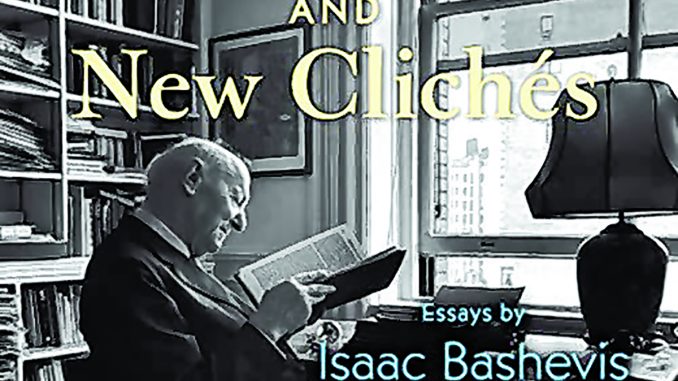
Review of: Old Truths and New Clinches: Essays by Isaac Bashevis Singer.
The critic Joseph Epstein liked to tell the story of an acquaintance who wanted something good to read while on a vacation. Epstein handed this young woman a book of stories by Isaac Bashevis Singer. The woman read and enjoyed the stories, while asking Epstein: “What century was this man born in?”
Epstein has been a prolific critic of American fiction. If he places Singer at the top of the list, it’s worth listening to. Now Singer, who won the Nobel Prize for Literature in 1978, has had an essay collection released over 30 years after his death at age 87 in 1991.
I, too, have always considered Singer to be one of the postwar era’s top short story writers, standing with Flannery O’Connor and John Cheever in mastering that most challenging of all literary genres. As with most fiction writers, Singer makes non-fiction look easy: His 1981 memoir, Lost In America is entertaining, adventurous, and bewildered: An exile who accepts his fate with good cheer.
My favorite in this collection is a satire of an imaginary release of The Ten Commandments and the response by an array of critics. Singer lets modern culture speak for itself. First, a critic from a labor newspaper:
While organized labor struggles with conservative big business for a four-day work week, Mr. Moses urges the working classes to toil six days and rest only on the Sabbath. We strongly recommend that our brothers in organized labor refute this swan song of NAM reaction.
Then, the gossip columnist: It’s a common talk around Broadway that the holier-than-thou Mr. Moses, of the best-selling Ten Commandments, is leaving his wife, Zipporah, home in the tents these nights to cavort with his Ethiopian cutie…The playboy’s sister, Miriam, is so upset that she ha broken out in a rash all over her body…The Hip Set also hears that Moses is grooming his brother, Aaron, for the priesthood…
Finally, a small-town newspaper editor checks in: So far as my understanding of the Ten Commandments extends, they re designed to be carried out, not simply to serve as a literary essay and…from that standpoint, they are quite okay. If humanity would literally adhere to them, the world would become a paradise. But Mr. Moses is naïve if he expects the world to take his commandments seriously. They will be read and forgotten, unless Hollywood decides to make them into a movie…
Fiction writers are born, not made. A Flannery O’Connor or Isaac Singer possessed storytelling gifts the average creative writing student lacks. For Singer, there were contours into harnessing and fulfilling those talents.
Humility is needed. A writer needs to believe in God. He needs to believe in the existence in evil. Singer’s view is similar to Norman Mailer’s, also expressed on these pages. As Jews, both Mailer and Singer had to confront (and bear) the enormities of the twentieth century. They had no choice. Such enormities concentrates the mind on that eternal conflict. As a native of the rural South, O’Connor also had to bear history’s burden. She, too, was a believer. This is why Jews and Southerners, as Robert Penn Warren observed, dominated 20th-century American letters. A writer must entertain, tell a simple story and above all, avoid cynicism. Too much can be gained from this world for a writer to dismiss the human experience with black humor. A writer must be a bard for his own people. He must be rooted in a particular place and time. A writer must reject a self-pitying alienation. He must share the fate of those same people. Above all, the writer must say yes to truth and beauty, say yes to resurrection. Believe in the power of language now used to uplift and inspire. Singer provides an example, the fruits of his work and countless others:
The Jewish people appears to be an exception among peoples…In the long history of our people, we have had our country for only a relatively short time. We used to and continue to live in many different lands, just as we have spoken and still speak innumerable languages. Thousands of mighty states have perished since our history began. Many languages and cultures have been forgotten. But we continue to live and show the power of resurrection. Only now, after two thousand years, have we begun to build up our ancient land. We have revived the Hebrew language, which for two thousand years was considered dead. We brought Aramaic with us into the Diaspora, a language which is spoken by no one today, and which has survived at all because of us.

Be the first to comment